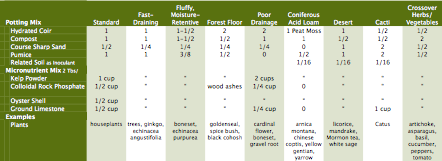One size does not fit all when it comes to potting or starting soils. It is easy to make your own, allows you to customize soils to the plant's needs and save some money not buying bagged potting soil. This is only a quick guide. For a thorough discussion, read The Medicinal Herb Grower volume I by Richo Cech, see Richo's chapter on Potting Soils.
Most seeds sprout best in fast draining soils that course water over the seed, the seed imbibes water and the soil drains before the next watering. These short cycles of watering, draining and resting create an expansion and contraction that awakens seeds, develop the embryo and then split the seed coat with the elongating radicle.
This approach creates live soils teaming with bacteria and interlaced with fungal mycelia which better mimic how nature germinates seeds. Some seeds will not germinate without the presents of Gibberellic GA3 acid, a germination stimulanting hormone, that is formed when fungi break down.
Sterilization of potting soil is done to reduce damping-off disease and to kill weed seeds. However, damping-off can be avoided by not overwatering flats on cool days, weeds can be controlled by pulling. All while your seeds get a better environment to germinate and grow.

view larger table
Ingredients
Coir is ground aged coconut pith that is an excellent base for good organic potting soil For most applications Coir works better than peat moss. Coir is pH neutral, peat moss is acidic with a pH around 4.8. As a grown product, coir is more ecologically sustainable than peat moss which is a mined product. It takes 5 gallons of water to hydrated one 11 pound compressed block of coir.
If you do not have compost you can use aged animal manure. Manure should be thoroughly composted to kill weed seeds and pathogens. This involves having a sufficient quantity of fresh material to reach critical mass so it heats up to 130˚F for 15 days and is turned 5 times over that period. You will need a specialized compost thermometer to read the pile temperature.
Use only 1/3 as much worm castings as compost listed above. Castings are a rich hot ingredient. If you do not have pumice, you can substitute perlite. If you don't have phosphate, substitute wood ash.
Inoculation
Gardeners and farmers are wise to make potting soil with living bacteria and fungi that matches natural conditions of a plant in the wild. Just a handful or half a shovel of native soils introduces the microorganisms plants need. Choose soils that mimic the plant's natural environment. Forest plants, such as Trillium, will benefit when a bit of live soil is added to the potting mix. Inoculate desert plants with half a shovelful of sand from the desert, cacti grow better when soil from around other established cacti is introduced. Moist loving plants will appreciate some soil from along a creek.
---
© 2012-2018 Restoration Seeds, LLC
